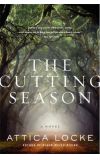
08 Oct 2012 21:33:42
For a minute, the glamorous cliché wiped away the discomfiture that had plagued me all day. The opening of Attica Locke's second novel does precisely the opposite. She begins with an unsettling moment of fear and drama that tells us very clearly we're not in Tara any more. There is, literally, a snake in the garden of Eden.
The Cutting Season is set in the fictitious Belle Vie plantation, where the magnificent antebellum mansion sits uneasily cheek by jowl with the restored slave quarters. Like its inspiration, Oak Alley, Belle Vie is a combination of museum and venue for parties and conferences. Local African Americans enact the roles of slaves in a sanitised interpretation of the plantation's dark history.
In one of the book's many compelling ironies, in its current iteration Belle Vie is managed by a black woman, Caren Gray. It's her job to make sure everything runs smoothly, from maintenance of the grounds to the historical tableaux staged for the public. It's a job for which Caren is overqualified, but she's a single mother with limited options in a struggling economy.
For Caren, Belle Vie's history is more than just another chapter in the tormented past of the American south. Her own mother worked at the house when it was still the family home of the Clancys. But the past has a longer reach than that – Caren is directly descended from Belle Vie slaves, notably a notorious runaway called Jason.
These days, the plantation's existence is precarious. Income doesn't match outgoings, and the conglomerate whose sugar-cane operation surrounds the now-meagre acreage have plenty of cash to tempt the Clancys to walk away from their history and sell up.
But when murder comes to Belle Vie, it appears to have nothing to do with anyone connected to the plantation. When the groundsman discovers a woman in a shallow grave by the property boundary, Caren soon discovers that the brutally murdered victim was a migrant worker on the cane-cutting operation on the other side of the fence. Her determination to make sure the woman's death is taken seriously becomes the engine that propels her into levels of danger she has never imagined.
Locke was shortlisted for the Orange Prize for her first novel, Black Water Rising, which similarly concerned itself with the black experience in recent American history. So it's no surprise that the slave past is a vivid part of the present-tense investigation. Locke is too subtle a writer to draw our attention to the parallels, but they're clear in the way the inquiry into the murder unfolds.
For Caren, it's like being the ribbon on a tug-of-war rope. Her loyalties are in conflict, her instincts pull her away from her best interests, and at the heart of it all lies threat. Her child, her future and her own life are cast into jeopardy as she tries to negotiate a safe path through the complicated jungle of Belle Vie's history.
It's a novel rich in atmosphere, strong in story, but at its heart The Cutting Season hinges on human complexity. The tangled rope of some kind of history has a stranglehold on everyone at the heart of this book, and their relationships give it a texture that reminds us why we come to fiction rather than the historical account. There are solutions here but no easy answers for Caren Gray, or for the rest of us.
At the close of this book, I couldn't help remembering the souvenir shops in the showpiece plantation houses. How we've managed to bring frivolity to places that were home to so much human misery. And I felt ashamed. Irresistibly reminiscent of Faulkner's resigned maxim, "The past is never dead. It's not even past", The Cutting Season does what the best crime fiction is can do: it illuminates our present in the light of our past and explains us to ourselves. On this evidence, Attica Locke is more than capable of that. And also of leaving us on the edge of our seats, hearts in our mouths.

